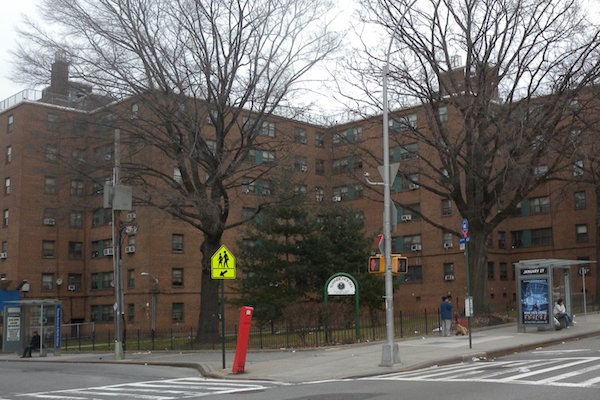The city yesterday settled a federal probe into the embattled New York City Housing Authority (NYCHA), in which it will pay $2.2 billion to repair the deplorable living conditions and agree to a federal monitor to ensure the repairs are done correctly and on time.
Monday’s deal ended a years long investigation from the Manhattan U.S. Attorney’s office that first started in 2015, and followed a recent cascade of scandals at NYCHA including falsified lead paint inspections, ongoing mold issues and repairs that were covered up rather than be completed.

The lawsuit alleged that between 2010 and 2016, at least 19 lead-poisoned children were found to have been exposed to deteriorated lead paint in their public housing apartments. The suit also noted the heating crisis last year that left over 80 percent of residents without heat or hot water.
The history making deal will eventually inject up to $4 billion into the authority for building improvements, including a $550 million state investment.
Under the settlement, the city will provide $1.2 billion of capital funding to the authority over the next five years and an additional $1 billion in capital funds over and above what the city has budgeted over a four-year period. Mayor Bill de Blasio’s administration has also agreed to pay an additional $200 million per year until the problems are considered fixed and the consent decree is no longer deemed necessary.
Despite having a scandal plagued NYCHA administration under his watch, de Blasio shared the blame with previous administrations.
“Decades of divestment by the federal and state governments and decades of neglect by New York City government have pushed our public housing system to the brink. By further acknowledging and providing solutions to a decades-old pattern of mismanagement, divestment and neglect, I am confident this settlement will be a turning point for our public housing system,” said de Blasio.
The federal complaint noted that living conditions at NYCHA are far from decent, safe, and sanitary. Across the city, residents are provided inadequate heat in winter, leading to frigid apartment temperatures. Pests and vermin infestations are common, and as senior New York City officials have acknowledged, NYCHA “has no idea how to handle rats.”
“Elevators often fail, leaving elderly or disabled residents trapped in their apartments or sleeping in building lobbies because they cannot return to their homes. Leaks, peeling paint, and other deterioration are commonplace, but go unaddressed,” read the complaint.


Brooklyn Borough President Eric L. Adams called for increased transparency among the housing authority’s top officials after reading the complaint..
“Like many New Yorkers, I am deeply disturbed by the details of the federal complaint against NYCHA, including actions taken that directly put the health and safety of children and families at risk. We need above and beyond transparency, beyond what the federal monitor will call for once appointed, to restore the public’s trust in NYCHA,” said Adams.
Adams went on to call for increased reporting of health and safety-related repairs and a release of a new capital plan with detailed outlines of the spending allocations.
“Tenants need to see — and trust — that investments in their health and safety are being put first, and that we are taking a real-time, data-driven approach to ensure our residents get results,” added Adams.
Public Advocate Letitia James echoed the same sentiments, urging housing advocates to keep NYCHA accountable and ensure living conditions actually improve for tenants.
“The consent decree announced today confirms some of our worst suspicions of mismanagement and malfeasance at NYCHA. Above all, it is inexcusable that the decisions made by NYCHA management put the health and safety of tenants at risk. But blame alone will not solve this problem. We must now match that money with sustained focus and diligence to ensure that conditions truly improve for our neighbors in NYCHA,” said James.


City Councilwoman Alicka Ampry-Samuel (D-Brownsville, East Flatbush, Crown Heights, Bedford-Stuyvesant) chair of the council Public Housing Committee, hailed the consent decree, as a hopeful move toward ensuring tenant health and safety among the city’s 150 housing developments.
“This consent decree is a crucial step in ensuring that NYCHA Families receive the needed remediation that have developed over decades of fiscal neglect and mismanagement. Over the next four years NYCHA residents will see substantial changes as funding from City, State and Federal governments are guaranteed under this decree,” said Ampry-Samuel.
Assemblyman Steven Cymbrowitz (D-Sheepshead Bay, Manhattan Beach, Brighton Beach) hailed the agreement and was hopeful for the future of public housing.
“The deception and subterfuge that characterized NYCHA’s management of a number of life-threatening, chronic and widespread problems at its housing developments are clearly unacceptable and must be remedied. With a new leadership team in place, I have full confidence that NYCHA and its 11,000 hardworking employees will move forward in resolving these serious conditions,” said Cymbrowitz.
The city’s housing authority is home to 390,000 public housing residents across 150 developments.










